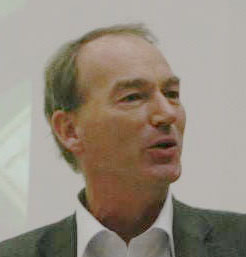Thomas Hylland Eriksen, the professor who made us fall in love with anthropology

Thomas Hylland Eriksen, Professor of Social Anthropology at the University of Oslo, passed away on 27 November, surrounded by his closest family. EASA mourns a unique intellectual and remarkably generous colleague who has inspired an entire generation of anthropologists.
Saying that European anthropology has lost one of its giants does not even begin to do justice to what Thomas meant for us all. We mourn his loss not only for EASA and European anthropology, but also for many of us to whom he served as an exemplary teacher, thinker, writer, human being, and friend.
Thomas was driven by a peculiar curiosity for the world. He had an extraordinary capacity to make cultural complexity understandable and he was tireless in his communication of social injustice. With more than 60 books, and translations into 30 languages, his research has made a crucial impact on anthropological understandings of identity, globalisation and - more recently - climate change. Many of us fell in love with anthropology through Small Places, Large Issues, an unusually engaging textbook serving as an introduction to anthropology at universities all over Europe. The book’s fifth edition remains a cornerstone in the teaching of anthropology across generations of anthropologists and students.
Thomas’ dedicated work as a teacher, lecturer, supervisor and colleague was always guided by a wonderful warmth and wittiness. Thomas was a real public intellectual, not least in his home country Norway, where he was something as unusual as an academic superstar. A lecture, debate or a public talk with Thomas present was guaranteed to be a success. He talked, and wrote, faster than anyone else. And he was never boring.
Thomas had a profound engagement for EASA. He served on the board of our association from 2015 until 2018, first as president, and then as vice-president. One of Thomas’ great concerns was to increase the visibility of anthropology in the public sphere, something which he tirelessly engaged in at home in Norway and more broadly on the Scandinavian scene. Tackling sensitive issues such as migration and multicultural society, Thomas moved hearts and minds through the power of his incredible public speaking skills, wit, warmth, and erudition. Thomas was also concerned with the divides within Europe when coming to resources, language politics and funding possibilities, not least for precarious and early career scholars. He worked hard to make sure EASA was an organisation for all of Europe.
While battling for years an unforgiving disease, he was an example of steadfastness and energy, but also of humility and wisdom. He recently wrote in a text published in Etnofoor:
It is possible to make our inevitable mortality sound as though the glass will always be half empty and that the world is a vale of tears, as it condemns us to death from the moment of birth. This is not necessarily the most helpful perspective. As I sat in an armchair at Rikshospitalet, freshly operated, unable to get up without help and with rubber tubes attached to my upper body, I realised that the sunlight outside the window was more than enough, there and then, to give me a vitamin shot of gratitude for the short time we humans spend wandering around aimlessly. Asking about an overall meaning of life is wrong. Life is meaning (Thomas Hylland Eriksen, ‘Turtle Life’).
We shall remember Thomas for the remarkable way he gave life - and anthropology - meaning.
In loving memory.
Hege Høyer Leivestad
Ana Ivasiuc,
On behalf of the EASA Executive committee

Photo: Yngve Vogt, UiO.






